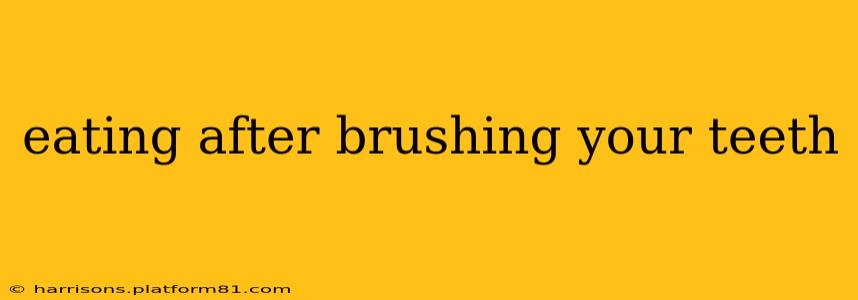Brushing your teeth is a crucial part of maintaining good oral hygiene. But what happens when the urge to snack strikes after that minty fresh feeling? Many people wonder if eating after brushing their teeth is harmful. The answer isn't a simple yes or no, and depends on several factors. This comprehensive guide will explore the effects of eating after brushing, addressing common concerns and providing practical advice.
Is it Bad to Eat After Brushing Your Teeth?
The short answer is: it depends. While brushing your teeth removes food particles and plaque, it doesn't create an impenetrable shield against acids. Eating acidic foods or drinks after brushing can temporarily weaken your enamel, making it more susceptible to erosion. However, simply eating a small, non-acidic snack likely won't cause significant harm. The key lies in what you eat and when you brush again.
What Happens When You Eat Acidic Foods After Brushing?
Acidic foods and drinks, such as citrus fruits, sodas, and even some juices, can lower the pH in your mouth. This acidic environment can soften your tooth enamel, making it more vulnerable to decay. Immediately after brushing, your enamel is slightly more porous, increasing the risk of acid erosion. This doesn't mean you should avoid these foods entirely, but moderation and timing are crucial.
What Foods Should I Avoid After Brushing?
It's best to avoid highly acidic foods and sugary snacks immediately after brushing. This includes:
- Citrus fruits: Oranges, lemons, grapefruits, etc.
- Carbonated drinks: Sodas, sparkling water (especially those flavored with citrus).
- Sugary snacks: Candy, cookies, pastries, etc.
- Dried fruits: These are highly concentrated in sugars.
What if I Eat After Brushing? When Should I Brush Again?
If you do eat after brushing, it's recommended to wait at least 30 minutes before brushing again. This allows your saliva to neutralize the acids in your mouth. Rushing to brush immediately after consuming acidic foods can actually scrub the softened enamel, potentially causing more damage.
How Can I Protect My Teeth After Eating?
Besides waiting before brushing, here are some tips to protect your teeth after eating:
- Rinse your mouth with water: This helps to wash away food particles and neutralize acids.
- Chew sugar-free gum: This stimulates saliva production, which helps to neutralize acids and remineralize teeth.
- Drink plenty of water: Water helps to cleanse your mouth and keep your saliva flowing.
Does Brushing Immediately After Eating Help?
Brushing immediately after eating is generally not recommended, especially if you've consumed acidic foods. Waiting allows your saliva to buffer the acids, minimizing the risk of enamel erosion.
Can I Eat Anything After Brushing?
No, not everything is created equal. While a small, non-acidic snack won't likely cause harm, it's wise to prioritize healthier options. Think of things like a handful of almonds, a piece of cheese, or some vegetables.
What's the Best Time to Brush Your Teeth?
Ideally, you should brush your teeth twice a day, for two minutes each time, using fluoride toothpaste. Brushing before bed is crucial to remove food particles and plaque that accumulate throughout the day. Brushing in the morning helps freshen breath and remove overnight bacteria.
Conclusion:
Eating after brushing isn't necessarily harmful, but it's important to be mindful of what you consume. Avoiding highly acidic and sugary foods immediately after brushing is key to protecting your enamel. Remembering to wait at least 30 minutes before brushing again after eating, and incorporating good oral hygiene practices like rinsing and chewing sugar-free gum will help maintain optimal oral health. Ultimately, balance and moderation are crucial for a healthy smile.
